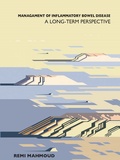Management of inflammatory bowel disease
A long-term perspective

Mahmoud, Remi
- Promoter:
- Prof.dr. B. (Bas) Oldenburg
- Co-promoter:
- Dr. B. (Bindia) Jharap
- Date:
- September 28, 2023
- Time:
- 16:15 h
Summary
Crohn’s disease and ulcerative colitis are chronic inflammatory bowel diseases (IBD) that are characterized by relapsing-remitting inflammation of the gastrointestinal tract. During episodes of active inflammation, patients with IBD may experience abdominal pain, diarrhea, rectal bleeding, weight loss and tiredness. In the long term, inflammation leads to irreversible damage to the gut and increases the risk of colorectal cancer. During the last decades, the introduction of new drugs including monoclonal antibodies targeting tumor necrosis factor-alpha (anti-TNF) have improved the management of IBD. Simultaneously, advances have been made in endoscopic techniques for visualization of the intestinal mucosa and resection of (pre)malignant lesions.
This thesis focuses on the long-term management of IBD. In section 1, we discuss whether patients in whom longstanding disease remission has been achieved with anti-TNF agents are able to de-escalate medical treatment. This would potentially decrease the risk of side effects for patients as well as costs for society. Results of our studies indicate that withdrawal of co-medication (thiopurines, methotrexate) appears relatively safe, but withdrawal of anti-TNF agents is associated with a high risk of a relapse of IBD. In both cases, objective assessment of disease remission and measurement of serum drug levels prior to disease withdrawal may be valuable to predict to risk of relapse. Section 2 discusses prevention of colorectal cancer in patients with IBD. Screening for colorectal cancer is performed with repeating colonoscopies to identify and resect pre-malignant lesions (dysplasia). We assess the value of potential risk factors for colorectal cancer in patients with IBD, including post-inflammatory polyps (remnants from past inflammation). Knowledge of risk factors for colorectal cancer in patients with IBD may aid to determine the optimal surveillance interval. This would allow prevention and/or early identification of colorectal cancer in high-risk patients, and reduce the burden and health care costs for patients at low risk of colorectal cancer.